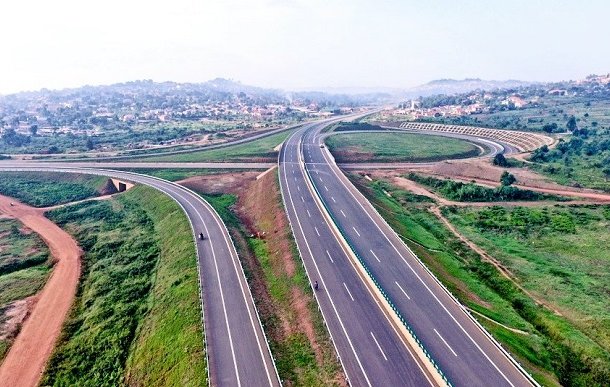Kampala, Uganda | Before dawn breaks over Entebbe, the low hum of engines builds into a steady roar. Among the commuters inching toward the capital is 47-year-old David Tumusiime, who pays Shs10,000 daily to use the Entebbe Expressway a modern toll road meant to ease travel but burdened by the weight of debt.
“It’s convenient, but costly,” he says. “If I saved that money each day, I could buy two kilos of sugar for my family.” Like many Ugandans, Tumusiime sees the toll not just as a fee, but as a daily reminder of the government’s borrowing spree.
The Entebbe Expressway funded through a $476 million (Shs1.78 trillion) loan from China Exim Bank is among Uganda’s most visible symbols of progress built on credit. Under the terms of the deal, the Uganda National Roads Authority (UNRA) will collect tolls for 18 years to repay the loan, with Egis Road Operation contracted to manage operations. By December 2023, toll revenue had reached Shs75 billion, every shilling of it directed toward debt repayment. For Tumusiime, the repayment period feels endless. “Even when I retire, this road will still be paying off the loan,” he sighs.
On October 20, 2025, Parliament began approving new loans worth Shs8.3 trillion to fund infrastructure and energy projects. Yet beyond the air-conditioned chambers, the decisions stir unease among citizens who see borrowing as both lifeline and liability. Finance Minister Henry Musasizi defended the new loans as essential for development. But Leader of the Opposition Joel Ssenyonyi challenged the transparency of the process, claiming that some loan agreements had already been signed before parliamentary approval. “If that’s true, then Parliament is just rubber-stamping decisions already made,” he warned. Speaker Thomas Tayebwa denied prior signings and assured MPs of due process. Still, the exchanges exposed a growing divide between government assurances and public trust. Outside Parliament, in markets and motor parks, people like Tumusiime worry less about procedure and more about the rising cost of living tied to every new loan.
According to the Ministry of Finance’s Annual Debt Statistical Bulletin (June 2025), Uganda’s total public debt had reached Shs116.2 trillion (US$32.3 billion), or 51.3% of GDP—up 26% from the previous year. Domestic borrowing jumped nearly 49% in a single year, further tightening liquidity and crowding out private businesses. Treasury Secretary Ramathan Ggoobi maintains that Uganda’s debt remains sustainable, announcing a $2 billion World Bank package to finance key sectors. But critics argue these “lifelines” have turned into long-term liabilities.
In Kampala’s Kikuubo market, trader Sarah Nabukenya arranges sacks of sugar and flour, lamenting how everything fuel, transport, food keeps getting more expensive. “They talk about loans in Parliament,” she says, “but we only feel them when prices go up.” For small traders and farmers, rising interest rates hovering around 20% have made credit nearly inaccessible. “Every time I go to the bank, they say rates have gone up,” says John Mukasa, a shop owner in Busega. “Government borrows heavily, and we pay the price.” In Kibaale District, maize farmer Taddewo Bwambale says high costs have cut production. “Loans are expensive; seeds and fertilizer are out of reach. We’re stuck,” he says. District forestry officer Patrick Abigaba adds, “We receive only 20% of our annual budget. Everything else is just planning on paper.”
Inside Parliament, debates revolve around billions; outside, the effects show in potholes, overcrowded hospitals, and crumbling classrooms. Manjiya County MP John Baptist Nambeshe warns, “We cannot keep borrowing money we can’t repay.” His colleague Muwanga Kivumbi adds, “Each loan must fund projects that generate revenue. Otherwise, we’re mortgaging our children’s future.” Woman MP Sarah Opendi agrees: “Transparency is key. We should only borrow for projects that can pay for themselves.”
The strain is clearest in education and health. In parts of Kibaale, half of government-aided schools lack proper classrooms, and students share one textbook among twenty. “We can’t repair buildings or buy enough materials,” one official confides. “Debt servicing consumes almost everything.”
Economists argue Uganda’s debt story is driven more by politics than economics. “Projects are chosen for political visibility, not economic value,” says economist Fred Muhumuza. “That’s how we end up with flashy highways and half-complete industrial parks.” Civil society leader Julius Mukunda warns that government borrowing through treasury bills crowds out private credit. “Investors are safe,” he says, “but citizens face scarcity.”
The World Bank’s 25th Uganda Economic Update supports these concerns, showing debt nearing 53% of GDP dangerously close to the red line. Country Manager Francisca Ayodeji Akala cautioned that “election-year spending and weak revenue collection threaten fiscal stability.” Uganda’s tax-to-GDP ratio remains just 14%, far below the Sub-Saharan average. Without stronger domestic revenue mobilization, the World Bank warns, Uganda risks mortgaging its future to mounting debt.
For teachers waiting on salaries, traders facing high prices, and farmers unable to buy fertilizer, debt is not abstract it’s personal. Each new loan passed in Parliament reverberates through kitchen tables and schoolyards across the country. When debt repayment consumes 40% of national revenue, the toll is paid not just in taxes but in lost opportunity delayed dreams, deferred futures.
As night falls, Tumusiime’s car glides along the toll road he pays for daily. The sign ahead reads, “Thank you for using the Entebbe Expressway.” He smiles faintly. “We’re all paying,” he says. “Even those who don’t use the road pay in other ways. Maybe one day Parliament will think about us before signing the next loan.” His headlights disappear into the dusk one more commuter carrying a share of Uganda’s growing debt, and the quiet hope that someday, development will mean more than repayment.
